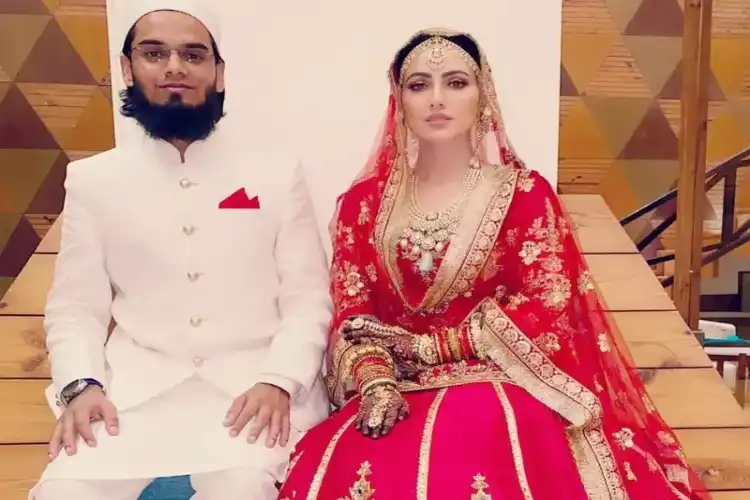
Eman Sakina
Marriage (nikah) is a solemn and sacred social contract between bride and groom. This contract is a strong covenant. The marriage contract in Islam is not a sacrament; it is revocable.
Both parties mutually agree and enter into this contract. Both bride and groom have the liberty to define various terms and conditions of their liking and make them a part of this contract. Nikah is considered an act of worship (ibadah). It is virtuous to conduct it in a Mosque keeping the ceremony simple. The marriage ceremony is a social as well as a religious activity. Islam advocates simplicity in ceremonies and celebrations. Prophet Muhammad considered simple weddings the best weddings.
Marriage is a major step in one’s life. It’s a matter of great responsibility that should by no means be taken lightly. However, it shouldn’t be complicated to the point if one doesn’t have enough cash to hold an elaborate ceremony with hundreds of guests, one can’t get married.
At times, our dear families worry too much about “What will others say about us?” when planning weddings. At times, people pressure themselves to put on a wedding that others will praise. It is notable to mention that our purpose in life is to please Allah before anyone else. Marriage is a means to please Allah and fulfill a Sunnah (Prophetic tradition). Thus, weddings should avoid anything that may displease Allah, including excessive spending.
Quite simply, marriage in Islam is solemnized by a nikah (marriage contract) and a walima (marriage feast) that follows once the marriage has been consummated. The nikah constitutes a proposal from one party and acceptance from another (qubool) in the presence of witnesses. The walima is simply a dinner to celebrate the marriage, since marriage is, after all, a joyous occasion.
The nikah can be held at the local masjid or home, while the walima can be anywhere: one’s apartment, backyard, or basement, the local masjid, a park, a restaurant, a community center, or anywhere else.
As well, on the occasions of nikah and walima, long speeches and an elaborate program are not required. Remember, simple is beautiful! Nowadays, we seem to have been so caught up in rituals and customs that we tend to waste enormous amounts of money and time on things that simply aren’t needed. Nikah and walima are both sunnah, so doesn’t it make sense to try to commemorate these occasions in the same fashion as he did?
There is nothing wrong with having an elaborate ceremony in a fancy banquet hall and a full-course meal prepared by a caterer, but the fact of the matter is that neither of these is a requirement for a successful marriage ceremony. If one wishes to hold the ceremony in a banquet hall with a full-course meal, that’s perfectly fine, but it shouldn’t be taken as a requirement.
.
I’m sure many of us loan large sums of money just so we can host fancy receptions for our weddings. Or even if we spend extravagant amounts of our own money, it’s sad because there are so many better uses for our hard-earned money. After all, the amount of money spent on the ceremony has no positive effect on the life of the couple.
The Prophet is reported to have said:“The marriage which is most greatly blessed is the one which is the lightest in burden (expense).
For sure, marriage is an occasion to celebrate, but why waste enormous amounts of money on a celebration? It’s not how our beloved Prophet Muhammad celebrated. Wasting Allah’s bounties is something Allah has warned us against: “But waste not by excess: for Allah loves not the wasters.”
It can be difficult to swim against the tide of fancy and extravagant marriages, but surely, it’s worth swimming against the tides that go against Allah’s command and the example set by the Prophet.
Wedding parties are among the things in which it is prescribed to express happiness and joy and to instill that in the family and the wife, but that does not mean that one should fall into extravagance or spend unnecessarily. The argument that it is only once in a lifetime cannot be an excuse to spend too much. Being extravagant only once is not allowed and is haram, just as being extravagant more than once is repeatedly falling into something that is not allowed and is haram. People spend so much money on their weddings. Rather than wasting your money, why not simply give that money to the couple to help them start their new life ahead? Why not allow the couple to give that money in ‘sadaqah’, therefore adding more blessings to their wedding and gaining reward from Allah for a good deed?
Also Read: Why Polygamy is allowed in Islam?
Nevertheless, there are positive effects that have come out of the experience of COVID. These days have revived the same old tradition of simple weddings rather than so-made exhibitionist weddings. Let’s save all that money and keep it for better uses. That money is sure to be in demand once the honeymoon is over and the actual daily routine sets in. If we do that with the right intention, we’ll end up saving money and at the same time, we’ll be adding to our good-deed account as well. After all, who can’t use some extra cash, some extra good deeds, and a greatly blessed marriage (since the most greatly blessed marriage is the one that lightest in expense)?
